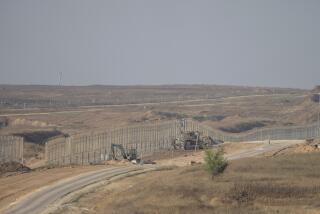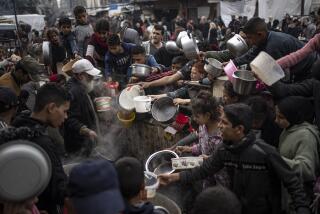60 Die Across Iraq, Many of Them in Security Forces
BAGHDAD — Gunfire, explosions and kidnappings picked up a withering pace across Iraq on Tuesday, killing at least 60 people, including many police officers and Iraqi soldiers. Government forces and U.S. troops raced through flames and smoke from one set of casualties to the next.
The violence that shook Baghdad, the capital, and towns to the north appeared to intensify anger against American soldiers and Prime Minister Nouri Maliki for not stemming unrelenting bloodshed that has led to thousands of deaths and widening sectarian tensions. Most of the attacks targeted Iraqi security forces and suggested a calculated effort to undermine Maliki’s new security plans.
The deadliest blast came near the industrial city of Baiji, about 120 miles northwest of the capital, where a roadside bomb exploded near a bus leaving an American base, killing 23 Iraqi soldiers and wounding 20, said Brig. Gen. Qassim Musawi, a spokesman for the Iraqi Ministry of Defense. The bus was heading to a training mission in Baghdad and most of the soldiers were from the northern city of Mosul, Musawi said.
In Baghdad’s Karada neighborhood, three policemen, three Iraqi soldiers and eight civilians were killed when a suicide car bomber targeted a bank where security forces had gone to pick up their monthly pay. Blood mixed with gasoline, pooling in the street. A youngster found the twisted motorcycle of his father, and learned later that the man was dead. The new rubble sat next to debris from similar explosions Thursday that killed 32 people.
“I carried a burned body to put it in the ambulance, but I saw three legs and then I discovered that the burned body of the attacker was mixed with another body of a victim,” said Abu Muntathar Husseini, who lives in the area.
“The terrorists are manufacturing their car bombs inside the security ring. The government should take better measures,” Husseini said. “Only Iraqis are being killed. No Americans are hurt by these terrorist acts. Our government is not being courageous in dealing with this situation. We need to face the terrorists.”
About 60 miles northeast of Baghdad, in Muqdadiya, a car bomb aimed at Iraqi security forces killed two policemen and five civilians near a hospital.
Sectarian fighting, ambushes of security forces by insurgents, kidnappings, assassinations and other violence are paralyzing many cities and towns. The U.S. is planning to increase its military presence in Baghdad from 9,000 to 13,000 troops, to help flush so-called death squads and militants from the capital, a move they say will restore order to the rest of the nation.
The Iraqi government has failed to defeat the insurgency and ease the bloodshed between Sunni and Shiite Muslims that has led to an undeclared civil war. Maliki’s efforts have been complicated by the activities of internal security forces, made up mainly of Shiites, who have been accused of joining the death squads. Interior Minister Jawad Bolani pledged this week to purge his department of “unfaithful and corrupt elements.”
But gunfire and explosions are constant, flaring like strikes of a match before quickly diminishing, then flaming again.
An attack on two minibuses carrying employees of the Iraqi Ministry of Electricity in northeast Baghdad killed four and injured seven. About the same time, a bomb exploded near the Ministry of Culture, killing one person and injuring four.
Gunmen killed two Shiites at a bridge in Baghdad, and a body bearing torture marks and execution-style wounds was found in the western part of the city.
The U.S. military announced two deaths: a soldier slain in fighting Tuesday in Al Anbar province and another killed Monday by a bomb that targeted a convoy south of Baghdad. British forces stationed in the south said that one soldier was killed overnight Monday in a mortar attack on a base in Basra.
Meanwhile, a Section 32 hearing, the military equivalent of a grand jury, began Tuesday in Baghdad for four soldiers with the 101st Airborne Division charged with murder in the shooting deaths of three Iraqi men. The Iraqis allegedly were handcuffed during a raid on a suspected militant training center near Samarra, about 60 miles north of the capital.
The soldiers -- Pfc. Corey R. Clagget, Spc. William B. Hunsaker, Staff Sgt. Raymond L. Girouard and Spc. Juston R. Graber -- could face court-martial.
Asad Abu Gulal, governor of the mostly Shiite southern province of Najaf, announced that armed gangs had kidnapped 45 people returning from a pilgrimage to Syria. Sunni and Shiite death squads have been attacking rival communities for months. Gulal said he had fired his police chief, and he called for better security to “stop the killings and kidnappings against” residents.
About 182,000 Iraqis have fled their homes to escape sectarian kidnappings and violence, according to government figures released this week.
There was no word on the fate of 26 people kidnapped Monday from the Iraqi American Chamber of Commerce and Industry and a cellphone company in a Shiite-dominated section of Baghdad.
The car bomb in Karada exploded shortly after 9:40 a.m. Tuesday. The predominantly middle-class Shiite neighborhood has become a target for insurgents and Sunni extremists.
A military convoy of about 10 vehicles had parked outside the Zuwiya bank, where security forces were collecting monthly salaries. Loose checkpoints had been set up, but witnesses said a suicide bomber drove into the crossroads and set off the explosion about 20 yards from the bank. Fire whirled through the street as 14 people were killed and seven cars destroyed.
“Every month at the same time they come to the Zuwiya bank,” Assad Fuad, a witness, said of the military convoy. “I saw the burned bodies on the ground. I saw four civilians burned and also Iraqi soldiers.”
Abu Mohammed Karadi said he was sitting in his office about 50 yards from the blast. “I remembered my days in the Iraqi army, so I jumped to the ground and stayed in place until the danger passed. I felt the shrapnel flying over me....
“This is a challenge to Maliki and his government. The terrorists are attacking Karada ... because of the large number of government officials here. It is a big mistake to come each month to the same place. They were attacked very easily,” he said.
A boy wandered onto the scene, searching amid the crater and charred cars. He noticed a motorcycle. It was damaged and bent, and it looked like his father’s. He asked no one in particular: “Is this my father’s? I’ve been calling him on his cellphone but it was off.”
An old man said, “Look, son, it might not be your father’s bike.” The boy shouted, cried and pointed: “That is the wire I put on my father’s motorcycle this morning!”
*
Special correspondents in Baghdad, Najaf, Tikrit and Kirkuk contributed to this report.
More to Read
Sign up for Essential California
The most important California stories and recommendations in your inbox every morning.
You may occasionally receive promotional content from the Los Angeles Times.











